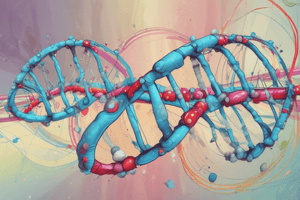Podcast
Questions and Answers
What is the core of genetics according to the text?
What is the core of genetics according to the text?
- How do genes carry information? (correct)
- Why do living beings inherit traits?
- How do variations in genetic codes give rise to new life forms?
- How do genes control growth and shape?
Which role involves designing experiments focused on gene function?
Which role involves designing experiments focused on gene function?
- Microscopy analyst
- Bioinformatics specialist
- Molecular biology research assistant (correct)
- Model organism constructor
What is a key responsibility of an undergraduate research assistant mentioned in the text?
What is a key responsibility of an undergraduate research assistant mentioned in the text?
- Operating laboratory equipment (correct)
- Analyzing cellular structures
- Constructing model organisms
- Collaborating with multi-disciplinary teams
What kind of expertise do candidates in genetics-related roles need according to the text?
What kind of expertise do candidates in genetics-related roles need according to the text?
What duty is typically performed by a biologist research assistant as per the text?
What duty is typically performed by a biologist research assistant as per the text?
What do individuals studying genetics aim to explore through DNA sequence manipulation with bioinformatics tools?
What do individuals studying genetics aim to explore through DNA sequence manipulation with bioinformatics tools?
Flashcards are hidden until you start studying
Study Notes
Discovering Genetics: An Introduction to Biology's Foundational Field
Genetics, a cornerstone of modern biology, explores how living beings inherit traits and develop over generations. At its core lies the fundamental questions: How do genes carry information; how does this information control growth and shape; and how do variations within genetic codes give rise to new life forms?
In today's labs, a wide array of roles and responsibilities involve studying genetics—from molecular biology research assistants to academically trained undergraduates. These individuals:
- Design experiments focused on gene function.
- Construct model organisms to explore gene regulation.
- Manipulate DNA sequences through bioinformatics tools.
- Analyze cellular structures via microscopy.
- Collaborate with multi-disciplinary teams to interpret findings.
These endeavors frequently align with the demands highlighted in job descriptions, where candidates need expertise ranging from basic lab techniques to sophisticated computational strategies.
For instance, a typical biologist research assistant performs duties such as operating laboratory equipment, running experiments, recording data, and contributing to reports and publications. Many undergraduate research assistants also play pivotal roles within university settings and beyond, fostering innovative thinking while producing original research output.
As research progresses, biologists continue to unveil intricate connections among molecules and cells, developing deeper insights into genomes, proteomes, epigenomics, and regulatory networks. From genetic disorders to evolutionary adaptations, genetics continues to revolutionize the fields of medicine, agriculture, and environmental conservation.
This exploration of genetics not only provides answers to essential queries regarding our existence but also opens up avenues for transforming humankind's relationship with nature itself. By applying evidence-based reasoning informed by genomic discoveries, scientists aim to improve public health outcomes, enhance crop yields, bolster ecosystem stability, and promote sustainable development across the globe.
Studying That Suits You
Use AI to generate personalized quizzes and flashcards to suit your learning preferences.




